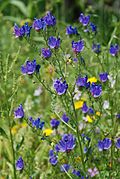Echium plantagineum
Echium plantagineum, commonly known as Paterson's curse, salvation Jane, purple viper's-bugloss, or lady Campbell's weed, is a species of flowering plant in the boraginaceae family. Native to western and southern Europe and western Asia, it has been introduced to Australia, South Africa, and the United States, where it is often considered an invasive species. The plant is notable for its striking purple flowers and its ability to thrive in a variety of soil types, although it prefers disturbed sites.
Description
Echium plantagineum is a biennial or short-lived perennial plant that can grow up to 60-70 cm in height. Its leaves are lanceolate to elliptical, rough in texture, and covered with small hairs. The plant produces dense spikes of deep purple to blue flowers, each with a protruding stamen, which bloom from late spring to summer. The fruit is a nutlet, containing seeds that can remain viable in the soil for several years.
Habitat and Distribution
Originally from the Mediterranean region, Echium plantagineum has spread to many parts of the world. In its native habitat, it is found in open fields, meadows, and along roadsides. As an invasive species, it has colonized similar habitats in other regions, particularly in Australia, where it poses a significant threat to agricultural lands and native ecosystems.
Ecological Impact
In areas where it has been introduced, Echium plantagineum can form dense stands that outcompete native vegetation, reducing biodiversity. It is particularly problematic in pasturelands, where it can take over and reduce the available forage for livestock. Additionally, the plant contains pyrrolizidine alkaloids, which are toxic to livestock, especially horses and cattle, leading to liver damage and potentially death if ingested in large quantities.
Control and Management
Managing Echium plantagineum infestations involves a combination of mechanical, chemical, and biological methods. Mechanical control includes plowing and mowing before the plant sets seed. Chemical control involves the use of herbicides, although care must be taken to avoid damage to native species and water sources. Biological control has also been explored, with the introduction of specific moth and weevil species that feed on the plant, although these methods require careful monitoring to avoid unintended ecological impacts.
Uses
Despite its status as a weed, Echium plantagineum has some beneficial uses. The plant is a source of nectar for bees and other pollinators. Additionally, it has been used in traditional medicine for its purported anti-inflammatory and analgesic properties, although scientific evidence supporting these uses is limited.
See Also
References
Transform your life with W8MD's budget GLP-1 injections from $125.
W8MD offers a medical weight loss program to lose weight in Philadelphia. Our physician-supervised medical weight loss provides:
- Most insurances accepted or discounted self-pay rates. We will obtain insurance prior authorizations if needed.
- Generic GLP1 weight loss injections from $125 for the starting dose.
- Also offer prescription weight loss medications including Phentermine, Qsymia, Diethylpropion, Contrave etc.
NYC weight loss doctor appointments
Start your NYC weight loss journey today at our NYC medical weight loss and Philadelphia medical weight loss clinics.
- Call 718-946-5500 to lose weight in NYC or for medical weight loss in Philadelphia 215-676-2334.
- Tags:NYC medical weight loss, Philadelphia lose weight Zepbound NYC, Budget GLP1 weight loss injections, Wegovy Philadelphia, Wegovy NYC, Philadelphia medical weight loss, Brookly weight loss and Wegovy NYC
|
WikiMD's Wellness Encyclopedia |
| Let Food Be Thy Medicine Medicine Thy Food - Hippocrates |
Medical Disclaimer: WikiMD is not a substitute for professional medical advice. The information on WikiMD is provided as an information resource only, may be incorrect, outdated or misleading, and is not to be used or relied on for any diagnostic or treatment purposes. Please consult your health care provider before making any healthcare decisions or for guidance about a specific medical condition. WikiMD expressly disclaims responsibility, and shall have no liability, for any damages, loss, injury, or liability whatsoever suffered as a result of your reliance on the information contained in this site. By visiting this site you agree to the foregoing terms and conditions, which may from time to time be changed or supplemented by WikiMD. If you do not agree to the foregoing terms and conditions, you should not enter or use this site. See full disclaimer.
Credits:Most images are courtesy of Wikimedia commons, and templates, categories Wikipedia, licensed under CC BY SA or similar.
Translate this page: - East Asian
中文,
日本,
한국어,
South Asian
हिन्दी,
தமிழ்,
తెలుగు,
Urdu,
ಕನ್ನಡ,
Southeast Asian
Indonesian,
Vietnamese,
Thai,
မြန်မာဘာသာ,
বাংলা
European
español,
Deutsch,
français,
Greek,
português do Brasil,
polski,
română,
русский,
Nederlands,
norsk,
svenska,
suomi,
Italian
Middle Eastern & African
عربى,
Turkish,
Persian,
Hebrew,
Afrikaans,
isiZulu,
Kiswahili,
Other
Bulgarian,
Hungarian,
Czech,
Swedish,
മലയാളം,
मराठी,
ਪੰਜਾਬੀ,
ગુજરાતી,
Portuguese,
Ukrainian
Contributors: Prab R. Tumpati, MD


